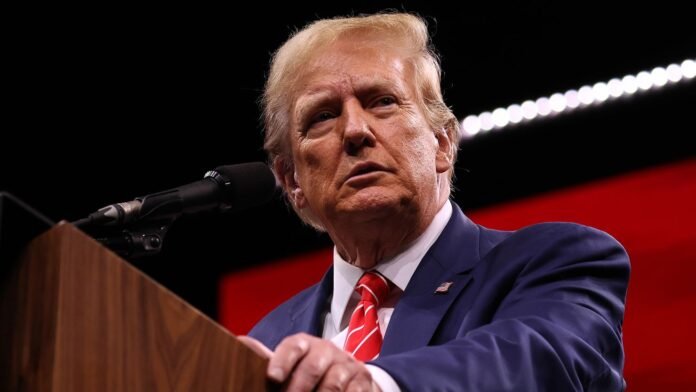President Donald Trump stated on Sunday that he will not back down on the sweeping tariffs he has imposed on imports from most countries unless they address trade imbalances with the U.S., remaining firm on his plans that have sparked market volatility, fueled concerns of a recession, and disrupted the global trading system.
Speaking to reporters aboard Air Force One, Trump acknowledged the market turmoil but expressed that sometimes “medicine” is necessary to fix long-standing issues. He emphasized that while he did not want to see global markets fall, he was not overly concerned about the sell-off.
Trump’s comments come as financial markets are expected to continue their downward trajectory when trading resumes on Monday. Despite the market instability, Trump’s aides attempted to reassure investors, saying that over 50 countries had expressed interest in negotiating an end to the tariffs. “I’ve spoken to many leaders from Europe, Asia, and around the world,” Trump said. “They are eager to make a deal, but we won’t accept deficits with your country. To me, a deficit is a loss. We will aim for surpluses or at worst, break even.”
The tariffs, which are set to take effect on Wednesday, represent a new phase of economic uncertainty with no clear resolution in sight. Treasury Secretary Scott Bessent noted that addressing unfair trade practices is not something that can be fixed quickly and that the U.S. must carefully assess what other countries offer.
Trump, who spent the weekend in Florida, posted on social media, stating, “WE WILL WIN. HANG TOUGH, it won’t be easy.” His administration’s officials defended the tariffs and downplayed concerns over the potential for a global recession.
“There doesn’t have to be a recession,” Bessent said. “We’re focused on strengthening the long-term economic fundamentals for prosperity.”
U.S. stock futures dropped sharply on Sunday evening as the tariffs continued to impact market confidence. S&P 500 futures fell by 2.5%, Dow Jones Industrial Average futures dropped 2.1%, and Nasdaq futures were down 3.1%. Even the price of bitcoin, which had been relatively stable, saw a nearly 6% decline.
Asian markets were hit hard as well. Tokyo’s Nikkei 225 index dropped by almost 8%, with Hong Kong’s Hang Seng plunging 9.4%, and China’s Shanghai Composite falling by 6.2%.
Trump’s tariff strategy, announced on April 2, fulfilled a major campaign promise to overhaul global trade agreements, a move he has long advocated for. His goal is to reduce trade deficits and shift economic dynamics in favor of the U.S., even if it means higher costs for consumers. White House economic adviser Kevin Hassett acknowledged that while foreign nations are “angry and retaliating,” they are also engaging in talks.
The tariffs are not only affecting adversaries but also U.S. allies. Israel, for example, is facing a 17% tariff, and Israeli Prime Minister Benjamin Netanyahu is set to meet with Trump to discuss the issue. Vietnam, a major clothing manufacturing hub, has also reached out to the administration, with its leader expressing interest in a deal to reduce tariffs to zero.
Italian Prime Minister Giorgia Meloni, a key European ally, disagreed with Trump’s tariff approach but stated she would use all necessary tools to support affected businesses.
Commerce Secretary Howard Lutnick reinforced that the tariffs are imminent, stating, “The tariffs are coming. Of course they are.” He added that Trump’s goal is to reset global trade, but committed only to keeping tariffs in place “for days and weeks.”
On Capitol Hill, Trump’s tariff policy has received both support and concern from Republican lawmakers. Several senators have proposed a new bipartisan bill that would require presidents to justify new tariffs to Congress. Rep. Don Bacon (R-Nebraska) said he would introduce a similar bill in the House to restore Congressional oversight over tariffs.
Senator John Barrasso, the No. 2 Republican in the Senate, defended Trump’s actions but acknowledged the widespread concern, especially as markets react negatively.
Billionaire Elon Musk, a supporter of Trump’s economic policies, expressed a desire for a “zero-tariff” arrangement between the U.S. and Europe during a recent event in Italy. However, White House trade adviser Peter Navarro dismissed Musk’s view, pointing out that the Tesla CEO was simply protecting his business interests.
Trump, meanwhile, disagreed with Musk’s stance, saying of the European Union, “They want to talk, but there’s no talk unless they pay us a lot of money on a yearly basis.”
Economist Lawrence Summers, a former treasury secretary, pointed out the contradictions in Trump’s approach, suggesting that if tariffs are eliminated, the U.S. could lose out on both revenue and the potential for businesses to relocate to the country. He argued that Trump cannot have both a permanent revenue source and a return to free trade.
The debate over tariffs continues, with ongoing discussions in Congress and the White House as both sides weigh the economic implications.
For more political updates, visit, DC Brief.


